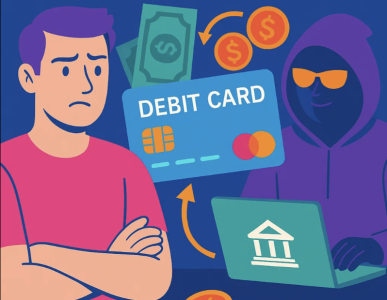Criminals Want to ‘Rent’ Your Bank Account. Have You Heard About This New Scam Trend?
- Replies 0
Imagine getting an offer to make easy cash just by letting someone use your bank account for a while. Sounds dodgy, doesn’t it? Yet this bizarre scheme is exactly what’s happening across Australia right now.
Authorities have raised the alarm about scammers trying to 'rent' ordinary people’s bank accounts as part of a money-laundering racket. It’s like a shady side hustle: criminals deposit their dirty money into your account, move it around, and presto! it looks legitimate to the banks.
In return, they’ll toss you a few hundred bucks for your trouble. Tempting? Maybe, especially with the rising cost of living – but make no mistake: this 'easy money' could land you in serious trouble.
In this editorial, we’ll dive into the details of this new 'money mule' scam, and explore other financial scams that are catching Australians off-guard. Whether you’re a tech-savvy senior or someone who still writes cheques at the local bank, it’s crucial to understand how these scams work and how to protect yourself. After all, Aussies lost a staggering $2.7 billion to scams in 2023 alone, with older Australians hit the hardest. So, top up your cuppa, settle in, and let’s have a yarn about what’s really going on with these financial scams – and what we can do about it.
These individuals, dubbed 'money mules,' essentially lend their bank accounts to criminal syndicates to help funnel illicit money around. Think of it as the scammers using your account like a laundering machine–washing dirty cash through a legitimate bank account so it comes out looking clean.
Here’s how it works: A scammer might approach you on social media, a messaging app, maybe even in person, and offer a quick payment–say $200 to $500–just for using your account briefly. They might spin a story: perhaps they’re 'overseas and need an Aussie account to move some funds,' or they’ll dangle it as a job opportunity ('work from home, just receive and send payments!').
Once you agree, they deposit dirty money (proceeds from crimes like fraud, drug trafficking, extortion, you name it) into your account. Then they have you transfer it out to another account or withdraw it as cash and deposit into a cryptocurrency ATM, which sends the money to the crooks’ digital wallets. By passing the funds through your legitimate account, the criminals obscure the money trail, making it harder for police to trace. It’s basically DIY money laundering–and you’re the washing machine.
It might sound far-fetched that anyone would go along with this. But when times are tough, an easy few hundred bucks can cloud judgment. Scammers know this. They often target people who are young, broke, or otherwise vulnerable. Job seekers get hit with fake 'employment' ads promising easy cash for little work – just use your bank account to process payments. Uni students and new migrants have been approached, as have people on social media seeing ads for quick cash. Sometimes scammers use threats ('Help us move this money or we’ll frame you for a crime'), or sob stories/romance ('Honey, can you do me a favor with your account?') to recruit mules. They exploit trust and fear in equal measure.
Authorities are in full-on crackdown mode. The Australian Federal Police (AFP) and Australian Banking Association have issued blunt warnings: do not share your banking details or loan out your accounts. In fact, Detective Superintendent Marie Andersson of the AFP minced no words. 'It is illegal to rent, buy or sell bank accounts, and doing so supports the criminal ecosystem,' she said.
Think about that–by handing over your account, you’re potentially helping organised crime thrive. Andersson added that 'your account may be housing money derived from scams, extortion, drug trafficking and terrorism.' In other words, that innocent-looking bank transfer could be the profits of a drug deal or a cybercrime ring, and you’re the one handling it. Not such a harmless favor, after all.
The consequences are very real. Not only could you lose your own money (if the crooks decide to empty your account or steal your identity details), but you could also face serious legal trouble. Money laundering is a major crime in Australia–we’re talking potential jail time.
In fact, in April 2025 a Sydney woman was jailed after she rented out 10 bank accounts to a crime syndicate, which laundered about $3.8 million through them. She’s one of several people charged in that operation. Imagine being in your twenties and getting locked up because you fell for a 'quick cash' gig, not exactly the career move she had in mind.
Even if you don’t end up in court, getting mixed up with these schemes can wreak havoc on your life. If a criminal uses your account for dirty dealings, your name could be flagged by banks and authorities. You might get your account frozen, or find yourself unwittingly implicated in a police investigation. As ABA (Australian Banking Association) Chief Executive Anna Bligh pointed out, these mule accounts are a key tool for scammers and banks are actively shutting them down. Bligh urged Aussies: 'If you've seen an advertisement or are approached to rent or sell your bank account, steer clear... There’s a good chance you’re being recruited to hide the profits of criminal activity.' And in perhaps the catchiest quote of all, she warned: 'Don’t let criminals cash in on your bank account.'
Bottom line? No legitimate person or company will ever need to 'borrow' your bank account. This scam is all risk and no reward for you. So if you hear about it or get an offer, do what any sensible Aussie would do–run a mile. Keep your accounts to yourself, no matter how sweet the deal sounds. As the old saying goes, if it sounds too good to be true, it probably is.
In 2023, Australians made over 600,000 reports about scams, a record number. And while overall losses dipped slightly from the year before, older people actually lost more money in 2023 than they did in 2022. Let that sink in, despite all our efforts, scammers are still outpacing us, especially when it comes to targeting seniors.
So, what scams should we be looking out for? According to the ACCC’s latest Targeting Scams report, the biggest money-losers last year were investment scams, followed by remote access (tech support) scams, and then romance scams. But those aren’t the only ones. Here’s a closer look at several major scam categories plaguing Australians:
They target people’s desires to grow their wealth, and they’ve become incredibly convincing. For retirees or older Australians managing their nest eggs, the pitch of 'high return, low risk' investments can be particularly enticing – and scammers know it. ACCC Deputy Chair Catriona Lowe noted that con artists are 'targeting older Australians with retirement savings who might be looking for investment opportunities.' In other words, they hunt where the money is, and for many, that’s the life savings of our seniors.
Also read: Man's investigation reveals complicated web of scams after losing thousands
One jaw-dropping example involved a scammer’s use of a deepfake video featuring none other than Elon Musk. Picture scrolling your social media and seeing a video of the famous billionaire apparently endorsing a get-rich-quick investment platform. An elderly Australian woman saw just that: a realistic fake video of Musk, and clicked the link, thinking she was getting in on a special opportunity. She entered her details and was soon contacted by a so-called 'financial adviser' who walked her through investing. They even gave her access to an official-looking online dashboard where her returns supposedly grew. It all looked legitimate, until she tried to withdraw her money. You can guess what happened next: poof, the money was gone. The poor woman lost her life savings to a phantom investment, all because technology tricked her into believing Elon Musk himself was inviting her to profit.
That story might sound extreme, but it’s far from an isolated case. Fake investment websites, bogus trading apps, and even scammers posing as real financial professionals are duping people every day. Some victims have reported being seduced by cryptocurrency trading scams (often called 'pig butchering' scams, because the scammers fatten you up with fake gains before slaughtering your account). Others get taken by old-school tricks like Ponzi schemes or 'guaranteed' high-interest bank deposits that are anything but guaranteed. The common theme is high pressure and high reward: scammers create a sense of urgency – 'Invest now or miss out!' – and play on the fear of missing a golden opportunity.
What’s the result? Australians in all age groups get scammed, but again, older folks often bear the brunt because they might have more capital to lose. Many are also not as familiar with cryptocurrency or the latest investment fads, which can make it harder to spot a fake. The median loss for investment scams is huge; when people fall, they fall hard, sometimes hundreds of thousands of dollars in one go.
In 2024 alone, Australians reported losing $23.6 million to dating and romance scams. Think about that: tens of millions meant for retirement, grandkids, or just comfortable living – gone, often sent overseas to some scam syndicate. A large chunk of these victims were older than 55, who accounted for well over half of all money lost in romance scams that year. How do these scams play out? Typically, it starts on a dating website or even on social media (Facebook, Instagram, etc.). You meet someone who seems perfect – maybe a bit too perfect. They might claim to be an Australian working abroad, or a charming foreigner with an interest in Australia. They shower you with sweet messages and even say they’ve 'fallen in love' rather quickly. (Red flag, right? But when you haven’t heard a kind word in ages, it’s powerful.)
Once the scammer has your trust and affection, the requests for money begin. Often it’s an emergency: they need help with a medical bill, or plane tickets to come visit you, or they have a surefire investment tip (uh-oh, overlap with investment scam!) and want you to join in. Lately, many romance scams have morphed into crypto-investment hybrids. The scammer convinces the victim to buy cryptocurrency – ostensibly as a shared investment or to help the scammer out – and then instructs them to transfer it to a certain wallet (which the scammer controls).
One major investigation in 2024 uncovered a scam compound in the Philippines where fraudsters posing as beautiful women online tricked mostly middle-aged Australian men into investing in crypto 'for our future together.' Over 5,000 Aussie phone numbers were found in that scheme’s database – 5,000 potential victims who were contacted. It was so serious that the AFP actually sent text warnings to those people telling them to cut off contact if they were chatting with an online lover asking for money.
The psychological manipulation in romance scams is intense. Scammers play on emotions – loneliness, compassion, even lust – to cloud their victims’ judgment. As AFP Commander Graeme Marshall aptly put it, when it comes to romance scams, 'protect your heart and your wallet. If it feels too good to be true, it probably is.' These criminals will say all the right things, but behind the keyboard it’s just a cold calculation: how to make you trust them enough to send money. They might spend weeks or months grooming a victim. And they often try to isolate you from others’ advice – maybe telling you 'Our love is special, others wouldn’t understand' to discourage you from confiding in family who might spot the scam.
One thing we want to stress, especially to our older readers: falling for a romance scam does not mean you’re foolish. It means the scammer was extremely skilled at deception. As one former fraud investigator noted after her own mother nearly got duped by a 'Hi Mum' scam (more on that scam soon), 'People aren't stupid. It's just scammers' tactics are so manipulative and coercive that people will comply.' The same applies here. These scams prey on normal human desires for love and connection. So if you ever find yourself or a friend in an online romance and money enters the picture, take a huge step back. True love will never require you to wire money to a stranger overseas or invest in shady schemes. And if someone you haven’t met in person is declaring undying love and asking for cash – well, that’s a giant red flag flapping in the wind.
This scam exploits that instant surge of panic a parent feels when they think their kid is in trouble. Even police officers’ families aren’t immune. In one real case, a former police officer’s elderly mother received a 'Hi Mum' text and genuinely believed her daughter was desperately asking for $4,750 to pay a bill. The mother tried to call her real daughter to verify, but couldn’t reach her (she was briefly tied up). Meanwhile the scammer kept the pressure on with urgent texts. The only thing that saved that mum from losing the money was her daughter calling back in the nick of time, right before the transfer went through. And mind you, this mum had been warned about the scam in the past! It just goes to show how, in the heat of the moment, emotions trump logic – especially when we’re worried about our kids.
The 'Hi Mum' (or sometimes 'Hi Dad') scam first popped up in Australia around 2022 and, three years on, it’s still tricking people. IDCARE, a national cyber support service, recorded a 37.5% rise in calls about the “Hi Mum” scam in 2024. Despite media coverage and public warnings, scammers know this formula works. Why? Because it feels personal and urgent. It doesn’t give you time to think. If you’re a senior whose adult child perhaps might realistically message from a new number (people do lose phones, after all), you could easily get fooled for those critical few minutes.
Beyond texts, there’s also the classic 'grandparent scam' phone call: a fraudster calls an elderly person, pretends to be their grandchild (or an official like a doctor/police officer on behalf of the grandchild), claiming an emergency (like 'I’m in jail and need bail money' or 'I’ve been in an accident'). They’ll beg the grandparent to wire money immediately and not tell mum and dad. These scams have been around a long time, but they still catch people off guard because they play on the deep care grandparents have for their grandchildren.
If you get a message like this, pause and verify. Call your family member on their known number. Or ask something only they would know. The scammers usually hope you’ll act right now out of love and fear. Taking a breather to double-check can make the difference. And never send money or give financial info in response to an unsolicited text or call, no matter who they claim to be. Your real family will understand if you hang up and call them back for confirmation. It’s better to be safe (even if it feels a bit awkward) than to be sorry and out of pocket thousands.
If you comply, you essentially hand the keys of your computer (and everything on it) to the scammer. They might then hunt for your online banking login, or ask you to log in while they watch, or even install malware. In some cases, they’ll show you bogus screens with errors and then say you need to pay a fee for a security subscription or new software to remove the virus. One variation involves the scammer creating a false panic (like 'Your bank account is under attack, we need you to transfer your money to a safe account we provide'). It’s all smoke and mirrors, but it can be very convincing, especially if you’re not a tech expert. A lot of seniors didn’t grow up with computers and might not immediately realize that Microsoft isn’t going to personally call you about a virus.
The damage from remote access scams is massive. In 2023, losses to these kinds of scams (sometimes called 'remote access scams' or 'technical support scams') were about $256 million – the second-highest of any scam type after investment scams. The reason they’re so lucrative is because once scammers have access, they can directly siphon money from bank accounts or trick victims into sending money themselves. I’ve heard of cases where scammers logged onto someone’s internet banking and quietly transferred funds, or where they convinced the person to buy thousands of dollars in gift cards as 'payment' for the supposed tech support service. Gift cards (like iTunes, Google Play, etc.) are a big red flag – no legitimate company asks for those as payment, but scammers love them because they’re hard to trace.
Another big one to watch out for are government impersonation calls, which are sort of a subset of this. The classic example is someone calling pretending to be from the Australian Tax Office (ATO) or another government body, claiming you owe money or there’s a warrant for your arrest. They’ll throw around legal-sounding threats – 'tax evasion,' 'court summons,' 'police coming to arrest you'– to scare people into paying fines on the spot. Often they demand the payment in those aforementioned gift cards or even cryptocurrency these days. Years ago, scammers infamously asked for iTunes gift cards as 'tax payments!' (Why an ATO officer would want $500 worth of iTunes cards, they don’t explain – but in the panic of the moment, victims aren’t thinking clearly.)
These government impersonation scams disproportionately hit the elderly as well, because older folks are more likely to be home to answer calls, and more likely to have a respectful fear of officialdom. As one ATO assistant commissioner observed, “they target elderly people who are at home a lot… those who don’t have a lot of contact with family and friends are a typical victim.”abc.net.au Scammers know if you’re isolated, you might not have someone immediately to ask, “Hey, does this sound fishy?” They corner you when you’re alone and rattle you with threats. I’ve heard of seniors so terrified by a fake ATO call that they withdrew cash and deposited it into a Bitcoin ATM as instructed, truly believing they were avoiding arrest.
So, remember: no real tech support or government agency will cold-call you and demand access to your device or your money. If Telstra or the NBN needs to reach you, they usually don’t, unless you’ve reported a fault – and they certainly won’t ask for remote access to your computer out of the blue. The ATO will never threaten arrest over the phone for unpaid taxes – you’d get official letters and have formal processes. Whenever someone calls unexpectedly about a tech or finance issue, be extremely skeptical. It’s perfectly fine to hang up and call the company back on their official number to check. Also, never install software or visit websites on the say-so of a random caller. It’s your device – you’re in control. And if a voice on the line is making your heart pound with fear, that’s a huge indicator it might be a scam. Scammers want you panicked so you don’t think straight. Hang up, take a breath, maybe call a trusted friend or relative and talk it over.
Another factor is the emotional and social aspect. Scammers exploit human psychology, and they know that as people age, they can become more isolated. Maybe the kids have moved out, you’ve retired from work, perhaps you’ve lost a partner – your social circle might be smaller than it once was. Scammers pounce on loneliness and trust. The romance scam is a direct play on this, offering companionship. The “Hi Mum” scam plays on a parent’s protective instinct. The fake ATO call exploits the fact that maybe you don’t have someone immediately there to say 'nah, it’s a con, hang up.' Criminals literally study what makes different age groups tick.
Consider this: in 2023, people over 65 were the only age group in Australia to see an increase in scam losses compared to the year before. Losses for that 65+ group jumped 13.3% to around $120 million for the year. Meanwhile, younger age groups actually reported fewer losses than prior years. That tells us scammers are zeroing in on seniors. Part of this is because, as mentioned, retirement savings are attractive. But also, older Australians might be perceived as more trusting or polite – less likely to hang up on someone, more likely to follow instructions from a perceived authority, etc. The ACCC report noted that older victims were disproportionately hit by investment scams initiated on social media, which is interesting – it suggests that many retirees are on Facebook or similar platforms, and scammers are contacting them there with things like fake investment ads or friend requests that lead to scams.
It’s not all doom and gloom, though. Awareness is growing, and many seniors are wising up to these tricks. The fact that overall scam losses decreased in 2023 is credited partly to better scam education and intervention by banks and government. There are also more resources now – like the government’s National Anti-Scam Centre – aimed at helping people before they get swindled. In a sense, we’re in a kind of arms race: scammers come up with a new con, then authorities and communities respond with warnings and safeguards, then scammers tweak their tactics, and so on. It keeps evolving.
For seniors in particular, community support is key. One of the best defenses against scams is staying connected. Talk to friends about weird calls you got – you might find they got the same call. Families, keep your older relatives in the loop about current scams (yes, that might mean having the 'there’s a lot of dodgy people out there' talk with your stubborn old Uncle Bob who thinks he knows it all – but it’s worth it if it saves his savings). And don’t be embarrassed if you almost fell for something and then realized – share that story! It can help others realize 'wow, it happened to them, it could happen to me.'
We’ve journeyed through the wild world of modern scams – from criminals renting bank accounts, to fake investment gurus, online Romeos, 'long-lost' kids texting for help, and phantom tech support agents. It’s a lot to take in, but this is the reality of our connected age. Scammers are constantly lurking, cooking up new schemes and refining old ones. It might feel overwhelming, but remember: the core tactics often remain the same. They exploit trust, greed, fear, or love. They want to rush you, isolate you, confuse you. Our best defense is to stay informed, maintain a healthy skepticism, and look out for each other.
Australia is fighting back – with task forces, new scam disruption hubs, and proposed mandatory codes to make banks and telcos crack down harder. Those efforts are important and promising (and frankly, it’s about time the big companies share more responsibility in shielding customers). But even the best government initiative can’t replace good old personal vigilance. As Financial Services Minister Stephen Jones said, scam losses are 'far too high' and we must all remain alert to the threat.
So let’s keep this conversation going, especially among our senior community who have so much to lose and deserve to enjoy their golden years in peace. Talk with your friends about scams you’ve heard of. Teach your grandkids a thing or two about phone fraud (trust me, scam education can go both ways across generations!). And never feel embarrassed to ask a question or double-check – taking an extra moment could save you from disaster.
At the end of the day, staying safe from scams isn’t a one-time lesson; it’s an ongoing awareness. New scam or old scam, the principles of caution remain. We can still enjoy the benefits of technology and modern finance – just with a filter of scepticism when strange stuff comes our way.
And now, I’ll leave you with a thought to ponder. We’ve seen how crafty and convincing scammers can be, even as authorities step up their game. The question is: in a world where fraudsters constantly adapt and evolve, are we doing enough to keep ourselves and our loved ones one step ahead of the scams?
Read more: Aussies are getting tricked into becoming money mules with one simple text message
Authorities have raised the alarm about scammers trying to 'rent' ordinary people’s bank accounts as part of a money-laundering racket. It’s like a shady side hustle: criminals deposit their dirty money into your account, move it around, and presto! it looks legitimate to the banks.
In return, they’ll toss you a few hundred bucks for your trouble. Tempting? Maybe, especially with the rising cost of living – but make no mistake: this 'easy money' could land you in serious trouble.
In this editorial, we’ll dive into the details of this new 'money mule' scam, and explore other financial scams that are catching Australians off-guard. Whether you’re a tech-savvy senior or someone who still writes cheques at the local bank, it’s crucial to understand how these scams work and how to protect yourself. After all, Aussies lost a staggering $2.7 billion to scams in 2023 alone, with older Australians hit the hardest. So, top up your cuppa, settle in, and let’s have a yarn about what’s really going on with these financial scams – and what we can do about it.
The New 'Side Hustle' Nightmare: Renting Out Your Bank Account
Let’s start with the scam that’s making headlines: criminals trying to rent or buy people’s bank account details. If someone asked to 'borrow' your bank account, you’d probably raise an eyebrow, right? But unfortunately, some folks – often those doing it tough – are getting roped into this scheme.These individuals, dubbed 'money mules,' essentially lend their bank accounts to criminal syndicates to help funnel illicit money around. Think of it as the scammers using your account like a laundering machine–washing dirty cash through a legitimate bank account so it comes out looking clean.
Here’s how it works: A scammer might approach you on social media, a messaging app, maybe even in person, and offer a quick payment–say $200 to $500–just for using your account briefly. They might spin a story: perhaps they’re 'overseas and need an Aussie account to move some funds,' or they’ll dangle it as a job opportunity ('work from home, just receive and send payments!').
Once you agree, they deposit dirty money (proceeds from crimes like fraud, drug trafficking, extortion, you name it) into your account. Then they have you transfer it out to another account or withdraw it as cash and deposit into a cryptocurrency ATM, which sends the money to the crooks’ digital wallets. By passing the funds through your legitimate account, the criminals obscure the money trail, making it harder for police to trace. It’s basically DIY money laundering–and you’re the washing machine.
It might sound far-fetched that anyone would go along with this. But when times are tough, an easy few hundred bucks can cloud judgment. Scammers know this. They often target people who are young, broke, or otherwise vulnerable. Job seekers get hit with fake 'employment' ads promising easy cash for little work – just use your bank account to process payments. Uni students and new migrants have been approached, as have people on social media seeing ads for quick cash. Sometimes scammers use threats ('Help us move this money or we’ll frame you for a crime'), or sob stories/romance ('Honey, can you do me a favor with your account?') to recruit mules. They exploit trust and fear in equal measure.
Authorities are in full-on crackdown mode. The Australian Federal Police (AFP) and Australian Banking Association have issued blunt warnings: do not share your banking details or loan out your accounts. In fact, Detective Superintendent Marie Andersson of the AFP minced no words. 'It is illegal to rent, buy or sell bank accounts, and doing so supports the criminal ecosystem,' she said.
Think about that–by handing over your account, you’re potentially helping organised crime thrive. Andersson added that 'your account may be housing money derived from scams, extortion, drug trafficking and terrorism.' In other words, that innocent-looking bank transfer could be the profits of a drug deal or a cybercrime ring, and you’re the one handling it. Not such a harmless favor, after all.
The consequences are very real. Not only could you lose your own money (if the crooks decide to empty your account or steal your identity details), but you could also face serious legal trouble. Money laundering is a major crime in Australia–we’re talking potential jail time.
In fact, in April 2025 a Sydney woman was jailed after she rented out 10 bank accounts to a crime syndicate, which laundered about $3.8 million through them. She’s one of several people charged in that operation. Imagine being in your twenties and getting locked up because you fell for a 'quick cash' gig, not exactly the career move she had in mind.
Even if you don’t end up in court, getting mixed up with these schemes can wreak havoc on your life. If a criminal uses your account for dirty dealings, your name could be flagged by banks and authorities. You might get your account frozen, or find yourself unwittingly implicated in a police investigation. As ABA (Australian Banking Association) Chief Executive Anna Bligh pointed out, these mule accounts are a key tool for scammers and banks are actively shutting them down. Bligh urged Aussies: 'If you've seen an advertisement or are approached to rent or sell your bank account, steer clear... There’s a good chance you’re being recruited to hide the profits of criminal activity.' And in perhaps the catchiest quote of all, she warned: 'Don’t let criminals cash in on your bank account.'
Bottom line? No legitimate person or company will ever need to 'borrow' your bank account. This scam is all risk and no reward for you. So if you hear about it or get an offer, do what any sensible Aussie would do–run a mile. Keep your accounts to yourself, no matter how sweet the deal sounds. As the old saying goes, if it sounds too good to be true, it probably is.
Other Scams Draining Aussies’ Savings
The money-mule account rental scam might be the new kid on the block, but unfortunately it’s just one piece of a much larger puzzle. Financial scammers have an entire playbook of tricks to separate Australians–particularly seniors–from their hard-earned savings. In this section, we’ll walk through some of the other common scams making the rounds. Some are high-tech, using the latest gadgets and social engineering; others are basically new spins on old cons that have been around for decades. All of them, however, are increasingly sophisticated and widespread.In 2023, Australians made over 600,000 reports about scams, a record number. And while overall losses dipped slightly from the year before, older people actually lost more money in 2023 than they did in 2022. Let that sink in, despite all our efforts, scammers are still outpacing us, especially when it comes to targeting seniors.
So, what scams should we be looking out for? According to the ACCC’s latest Targeting Scams report, the biggest money-losers last year were investment scams, followed by remote access (tech support) scams, and then romance scams. But those aren’t the only ones. Here’s a closer look at several major scam categories plaguing Australians:
1. Investment Scams: The Fake Goldmine
Investment scams are the heavyweight champion of fraud in terms of dollars stolen. In 2023 these scams stole over $1.3 billion from Australians. These schemes often promise lucrative returns on things like stocks, commodities, or the current favorite buzzword: cryptocurrency.They target people’s desires to grow their wealth, and they’ve become incredibly convincing. For retirees or older Australians managing their nest eggs, the pitch of 'high return, low risk' investments can be particularly enticing – and scammers know it. ACCC Deputy Chair Catriona Lowe noted that con artists are 'targeting older Australians with retirement savings who might be looking for investment opportunities.' In other words, they hunt where the money is, and for many, that’s the life savings of our seniors.
Also read: Man's investigation reveals complicated web of scams after losing thousands
One jaw-dropping example involved a scammer’s use of a deepfake video featuring none other than Elon Musk. Picture scrolling your social media and seeing a video of the famous billionaire apparently endorsing a get-rich-quick investment platform. An elderly Australian woman saw just that: a realistic fake video of Musk, and clicked the link, thinking she was getting in on a special opportunity. She entered her details and was soon contacted by a so-called 'financial adviser' who walked her through investing. They even gave her access to an official-looking online dashboard where her returns supposedly grew. It all looked legitimate, until she tried to withdraw her money. You can guess what happened next: poof, the money was gone. The poor woman lost her life savings to a phantom investment, all because technology tricked her into believing Elon Musk himself was inviting her to profit.
That story might sound extreme, but it’s far from an isolated case. Fake investment websites, bogus trading apps, and even scammers posing as real financial professionals are duping people every day. Some victims have reported being seduced by cryptocurrency trading scams (often called 'pig butchering' scams, because the scammers fatten you up with fake gains before slaughtering your account). Others get taken by old-school tricks like Ponzi schemes or 'guaranteed' high-interest bank deposits that are anything but guaranteed. The common theme is high pressure and high reward: scammers create a sense of urgency – 'Invest now or miss out!' – and play on the fear of missing a golden opportunity.
What’s the result? Australians in all age groups get scammed, but again, older folks often bear the brunt because they might have more capital to lose. Many are also not as familiar with cryptocurrency or the latest investment fads, which can make it harder to spot a fake. The median loss for investment scams is huge; when people fall, they fall hard, sometimes hundreds of thousands of dollars in one go.
2. Romance Scams: Heartbreak and Wallet-Break
They say love is blind, and scammers take full advantage of that. Romance scams involve fraudsters building fake relationships with victims (often online) to win their trust and ultimately get money out of them. It’s a cruel con, because it doesn’t just steal money – it can shatter hearts and destroy someone’s confidence. And yes, seniors are frequently targeted here too, especially those who may be widowed, divorced, or simply lonely and looking for companionship.In 2024 alone, Australians reported losing $23.6 million to dating and romance scams. Think about that: tens of millions meant for retirement, grandkids, or just comfortable living – gone, often sent overseas to some scam syndicate. A large chunk of these victims were older than 55, who accounted for well over half of all money lost in romance scams that year. How do these scams play out? Typically, it starts on a dating website or even on social media (Facebook, Instagram, etc.). You meet someone who seems perfect – maybe a bit too perfect. They might claim to be an Australian working abroad, or a charming foreigner with an interest in Australia. They shower you with sweet messages and even say they’ve 'fallen in love' rather quickly. (Red flag, right? But when you haven’t heard a kind word in ages, it’s powerful.)
Once the scammer has your trust and affection, the requests for money begin. Often it’s an emergency: they need help with a medical bill, or plane tickets to come visit you, or they have a surefire investment tip (uh-oh, overlap with investment scam!) and want you to join in. Lately, many romance scams have morphed into crypto-investment hybrids. The scammer convinces the victim to buy cryptocurrency – ostensibly as a shared investment or to help the scammer out – and then instructs them to transfer it to a certain wallet (which the scammer controls).
One major investigation in 2024 uncovered a scam compound in the Philippines where fraudsters posing as beautiful women online tricked mostly middle-aged Australian men into investing in crypto 'for our future together.' Over 5,000 Aussie phone numbers were found in that scheme’s database – 5,000 potential victims who were contacted. It was so serious that the AFP actually sent text warnings to those people telling them to cut off contact if they were chatting with an online lover asking for money.
The psychological manipulation in romance scams is intense. Scammers play on emotions – loneliness, compassion, even lust – to cloud their victims’ judgment. As AFP Commander Graeme Marshall aptly put it, when it comes to romance scams, 'protect your heart and your wallet. If it feels too good to be true, it probably is.' These criminals will say all the right things, but behind the keyboard it’s just a cold calculation: how to make you trust them enough to send money. They might spend weeks or months grooming a victim. And they often try to isolate you from others’ advice – maybe telling you 'Our love is special, others wouldn’t understand' to discourage you from confiding in family who might spot the scam.
One thing we want to stress, especially to our older readers: falling for a romance scam does not mean you’re foolish. It means the scammer was extremely skilled at deception. As one former fraud investigator noted after her own mother nearly got duped by a 'Hi Mum' scam (more on that scam soon), 'People aren't stupid. It's just scammers' tactics are so manipulative and coercive that people will comply.' The same applies here. These scams prey on normal human desires for love and connection. So if you ever find yourself or a friend in an online romance and money enters the picture, take a huge step back. True love will never require you to wire money to a stranger overseas or invest in shady schemes. And if someone you haven’t met in person is declaring undying love and asking for cash – well, that’s a giant red flag flapping in the wind.
3. 'Hi Mum, It’s Me': Family Impersonation Scams
Now for a scam that’s alarmingly simple and yet scarily effective: the family impersonation text message, commonly known as the 'Hi Mum' scam. This con specifically targets parents and grandparents, tugging at the heartstrings. It usually starts with a text from an unknown number, but the message goes something like: 'Hi Mum/Dad, I lost my phone, this is my new number.' Sometimes they add a little story – 'phone fell in the toilet' or 'I’m using a friend’s phone.' The unwitting parent, thinking their child genuinely has a new number, saves it and continues the conversation. Before long, the scammer posing as the child says they have a problem – an urgent bill to pay, or they’re in some trouble – and they need money immediately. They’ll plead for secrecy ('I’m embarrassed, please don’t tell anyone') and pressure the parent to do a bank transfer or multiple transfers in a hurry.This scam exploits that instant surge of panic a parent feels when they think their kid is in trouble. Even police officers’ families aren’t immune. In one real case, a former police officer’s elderly mother received a 'Hi Mum' text and genuinely believed her daughter was desperately asking for $4,750 to pay a bill. The mother tried to call her real daughter to verify, but couldn’t reach her (she was briefly tied up). Meanwhile the scammer kept the pressure on with urgent texts. The only thing that saved that mum from losing the money was her daughter calling back in the nick of time, right before the transfer went through. And mind you, this mum had been warned about the scam in the past! It just goes to show how, in the heat of the moment, emotions trump logic – especially when we’re worried about our kids.
The 'Hi Mum' (or sometimes 'Hi Dad') scam first popped up in Australia around 2022 and, three years on, it’s still tricking people. IDCARE, a national cyber support service, recorded a 37.5% rise in calls about the “Hi Mum” scam in 2024. Despite media coverage and public warnings, scammers know this formula works. Why? Because it feels personal and urgent. It doesn’t give you time to think. If you’re a senior whose adult child perhaps might realistically message from a new number (people do lose phones, after all), you could easily get fooled for those critical few minutes.
Beyond texts, there’s also the classic 'grandparent scam' phone call: a fraudster calls an elderly person, pretends to be their grandchild (or an official like a doctor/police officer on behalf of the grandchild), claiming an emergency (like 'I’m in jail and need bail money' or 'I’ve been in an accident'). They’ll beg the grandparent to wire money immediately and not tell mum and dad. These scams have been around a long time, but they still catch people off guard because they play on the deep care grandparents have for their grandchildren.
If you get a message like this, pause and verify. Call your family member on their known number. Or ask something only they would know. The scammers usually hope you’ll act right now out of love and fear. Taking a breather to double-check can make the difference. And never send money or give financial info in response to an unsolicited text or call, no matter who they claim to be. Your real family will understand if you hang up and call them back for confirmation. It’s better to be safe (even if it feels a bit awkward) than to be sorry and out of pocket thousands.
4. Tech Support Scams and Remote Access Cons
Now let’s switch gears to a more technical type of scam that has ensnared many older Australians: the tech support scam. This is where someone calls you out of the blue, pretending to be from a well-known company – often Telstra, NBN, Microsoft, or even Amazon – and claims there’s something wrong with your computer, internet, or account. They sound very professional and concerned. 'Sir, your computer is infected with a dangerous virus,' or 'Ma’am, we’ve detected hackers trying to get into your bank account through your internet.' Hearing that, anyone would be worried. The scammer then offers to 'help' you fix the issue – which involves guiding you to install some software or give them remote access to your device.If you comply, you essentially hand the keys of your computer (and everything on it) to the scammer. They might then hunt for your online banking login, or ask you to log in while they watch, or even install malware. In some cases, they’ll show you bogus screens with errors and then say you need to pay a fee for a security subscription or new software to remove the virus. One variation involves the scammer creating a false panic (like 'Your bank account is under attack, we need you to transfer your money to a safe account we provide'). It’s all smoke and mirrors, but it can be very convincing, especially if you’re not a tech expert. A lot of seniors didn’t grow up with computers and might not immediately realize that Microsoft isn’t going to personally call you about a virus.
The damage from remote access scams is massive. In 2023, losses to these kinds of scams (sometimes called 'remote access scams' or 'technical support scams') were about $256 million – the second-highest of any scam type after investment scams. The reason they’re so lucrative is because once scammers have access, they can directly siphon money from bank accounts or trick victims into sending money themselves. I’ve heard of cases where scammers logged onto someone’s internet banking and quietly transferred funds, or where they convinced the person to buy thousands of dollars in gift cards as 'payment' for the supposed tech support service. Gift cards (like iTunes, Google Play, etc.) are a big red flag – no legitimate company asks for those as payment, but scammers love them because they’re hard to trace.
Another big one to watch out for are government impersonation calls, which are sort of a subset of this. The classic example is someone calling pretending to be from the Australian Tax Office (ATO) or another government body, claiming you owe money or there’s a warrant for your arrest. They’ll throw around legal-sounding threats – 'tax evasion,' 'court summons,' 'police coming to arrest you'– to scare people into paying fines on the spot. Often they demand the payment in those aforementioned gift cards or even cryptocurrency these days. Years ago, scammers infamously asked for iTunes gift cards as 'tax payments!' (Why an ATO officer would want $500 worth of iTunes cards, they don’t explain – but in the panic of the moment, victims aren’t thinking clearly.)
These government impersonation scams disproportionately hit the elderly as well, because older folks are more likely to be home to answer calls, and more likely to have a respectful fear of officialdom. As one ATO assistant commissioner observed, “they target elderly people who are at home a lot… those who don’t have a lot of contact with family and friends are a typical victim.”abc.net.au Scammers know if you’re isolated, you might not have someone immediately to ask, “Hey, does this sound fishy?” They corner you when you’re alone and rattle you with threats. I’ve heard of seniors so terrified by a fake ATO call that they withdrew cash and deposited it into a Bitcoin ATM as instructed, truly believing they were avoiding arrest.
So, remember: no real tech support or government agency will cold-call you and demand access to your device or your money. If Telstra or the NBN needs to reach you, they usually don’t, unless you’ve reported a fault – and they certainly won’t ask for remote access to your computer out of the blue. The ATO will never threaten arrest over the phone for unpaid taxes – you’d get official letters and have formal processes. Whenever someone calls unexpectedly about a tech or finance issue, be extremely skeptical. It’s perfectly fine to hang up and call the company back on their official number to check. Also, never install software or visit websites on the say-so of a random caller. It’s your device – you’re in control. And if a voice on the line is making your heart pound with fear, that’s a huge indicator it might be a scam. Scammers want you panicked so you don’t think straight. Hang up, take a breath, maybe call a trusted friend or relative and talk it over.
Why Seniors Are in the Crosshairs
By now, a pattern might be emerging: a lot of these scams disproportionately affect older Australians. It’s not because older people aren’t smart – far from it. It’s often about circumstance and context. Many seniors have spent a lifetime building up savings, equity in homes, superannuation funds, etc. In the eyes of scammers, that makes them lucrative targets – there’s more to steal. At the same time, seniors may be less familiar with some of the new technologies and platforms where scams proliferate (like cryptocurrency, or social media scams). It’s a dangerous combination: more assets, and perhaps less digital savvy.Another factor is the emotional and social aspect. Scammers exploit human psychology, and they know that as people age, they can become more isolated. Maybe the kids have moved out, you’ve retired from work, perhaps you’ve lost a partner – your social circle might be smaller than it once was. Scammers pounce on loneliness and trust. The romance scam is a direct play on this, offering companionship. The “Hi Mum” scam plays on a parent’s protective instinct. The fake ATO call exploits the fact that maybe you don’t have someone immediately there to say 'nah, it’s a con, hang up.' Criminals literally study what makes different age groups tick.
Consider this: in 2023, people over 65 were the only age group in Australia to see an increase in scam losses compared to the year before. Losses for that 65+ group jumped 13.3% to around $120 million for the year. Meanwhile, younger age groups actually reported fewer losses than prior years. That tells us scammers are zeroing in on seniors. Part of this is because, as mentioned, retirement savings are attractive. But also, older Australians might be perceived as more trusting or polite – less likely to hang up on someone, more likely to follow instructions from a perceived authority, etc. The ACCC report noted that older victims were disproportionately hit by investment scams initiated on social media, which is interesting – it suggests that many retirees are on Facebook or similar platforms, and scammers are contacting them there with things like fake investment ads or friend requests that lead to scams.
It’s not all doom and gloom, though. Awareness is growing, and many seniors are wising up to these tricks. The fact that overall scam losses decreased in 2023 is credited partly to better scam education and intervention by banks and government. There are also more resources now – like the government’s National Anti-Scam Centre – aimed at helping people before they get swindled. In a sense, we’re in a kind of arms race: scammers come up with a new con, then authorities and communities respond with warnings and safeguards, then scammers tweak their tactics, and so on. It keeps evolving.
For seniors in particular, community support is key. One of the best defenses against scams is staying connected. Talk to friends about weird calls you got – you might find they got the same call. Families, keep your older relatives in the loop about current scams (yes, that might mean having the 'there’s a lot of dodgy people out there' talk with your stubborn old Uncle Bob who thinks he knows it all – but it’s worth it if it saves his savings). And don’t be embarrassed if you almost fell for something and then realized – share that story! It can help others realize 'wow, it happened to them, it could happen to me.'
Fighting Back: How to Stay Safe from Scams
We’ve covered a lot of scam horror stories, so you might be feeling a bit uneasy. But knowledge is power – and there are ways to protect yourself. Think of it like learning self-defense, but for your money and personal info. Here are some practical tips and takeaways, drawn from expert advice and common-sense rules, to help you stay one step ahead of the scammers:- Guard Your Personal Info: Never share banking details, PINs, passwords, or one-time codes with anyone you don’t know and trust. No legitimate bank or government agent will ask for your PIN or online banking password over the phone – ever. If someone asks, it’s a scam. Likewise, be wary of emails/texts asking you to 'verify' your details via a link – it could be phishing.
- Don’t Play Middleman: If someone (even a friend or romantic interest) asks you to receive money into your account and send it on, just say no. This is the hallmark of money mule schemes. You might be told a convincing story (e.g. 'I need to pay my contractors but my international account is frozen, can you help?'), but remember the warnings: 'If someone asks to use or "borrow" your bank account, say ‘no.’' You do not want to be caught in the web of laundering money for criminals.
- Verify, Verify, Verify: For any unsolicited contact – be it a supposed bank, a tech support call, or even that 'Hi Mum' text – verify through a second channel. Call back on an official number you find yourself (from a bank statement or phone book). If 'Telstra' calls you, hang up and call Telstra’s published customer service line to ask if they tried to reach you (99% of the time, they didn’t). If 'your grandson' sends a weird request, call your grandson’s real number to confirm. Taking a moment to verify can thwart most impersonators.
- Slow Down & Stay Calm: Scammers love to create urgency – it’s a big red flag. Whether it’s 'Invest now, limited slots!' or 'Pay immediately or you’ll be arrested!', high-pressure tactics are your cue to pause. Don’t rush into payments or decisions. Real financial opportunities won’t vanish in minutes, and real authorities don’t demand instant action. As the ACCC advises: STOP – THINK – PROTECT. Stop and take a breath; think about whether the situation makes sense; protect yourself by not divulging info or money until you’re sure.
- Use Tools and Help Available: Consider call-blocking apps or services for scam calls. Many telcos in Australia offer spam call filtering. Keep your computer and smartphone security up to date – it helps fend off some phishing and malware. And if you do get scammed or notice something fishy, report it. Contact your bank immediately if money is involved – they might recover funds or secure your account. Report scams to Scamwatch or the police (ReportCyber). Not only could this help you possibly get help, it also helps authorities warn others. There’s no need to be ashamed – remember, these are professional criminals; reporting them is a civic duty, not an admission of gullibility.
We’ve journeyed through the wild world of modern scams – from criminals renting bank accounts, to fake investment gurus, online Romeos, 'long-lost' kids texting for help, and phantom tech support agents. It’s a lot to take in, but this is the reality of our connected age. Scammers are constantly lurking, cooking up new schemes and refining old ones. It might feel overwhelming, but remember: the core tactics often remain the same. They exploit trust, greed, fear, or love. They want to rush you, isolate you, confuse you. Our best defense is to stay informed, maintain a healthy skepticism, and look out for each other.
Australia is fighting back – with task forces, new scam disruption hubs, and proposed mandatory codes to make banks and telcos crack down harder. Those efforts are important and promising (and frankly, it’s about time the big companies share more responsibility in shielding customers). But even the best government initiative can’t replace good old personal vigilance. As Financial Services Minister Stephen Jones said, scam losses are 'far too high' and we must all remain alert to the threat.
So let’s keep this conversation going, especially among our senior community who have so much to lose and deserve to enjoy their golden years in peace. Talk with your friends about scams you’ve heard of. Teach your grandkids a thing or two about phone fraud (trust me, scam education can go both ways across generations!). And never feel embarrassed to ask a question or double-check – taking an extra moment could save you from disaster.
At the end of the day, staying safe from scams isn’t a one-time lesson; it’s an ongoing awareness. New scam or old scam, the principles of caution remain. We can still enjoy the benefits of technology and modern finance – just with a filter of scepticism when strange stuff comes our way.
And now, I’ll leave you with a thought to ponder. We’ve seen how crafty and convincing scammers can be, even as authorities step up their game. The question is: in a world where fraudsters constantly adapt and evolve, are we doing enough to keep ourselves and our loved ones one step ahead of the scams?
Read more: Aussies are getting tricked into becoming money mules with one simple text message
Last edited:















